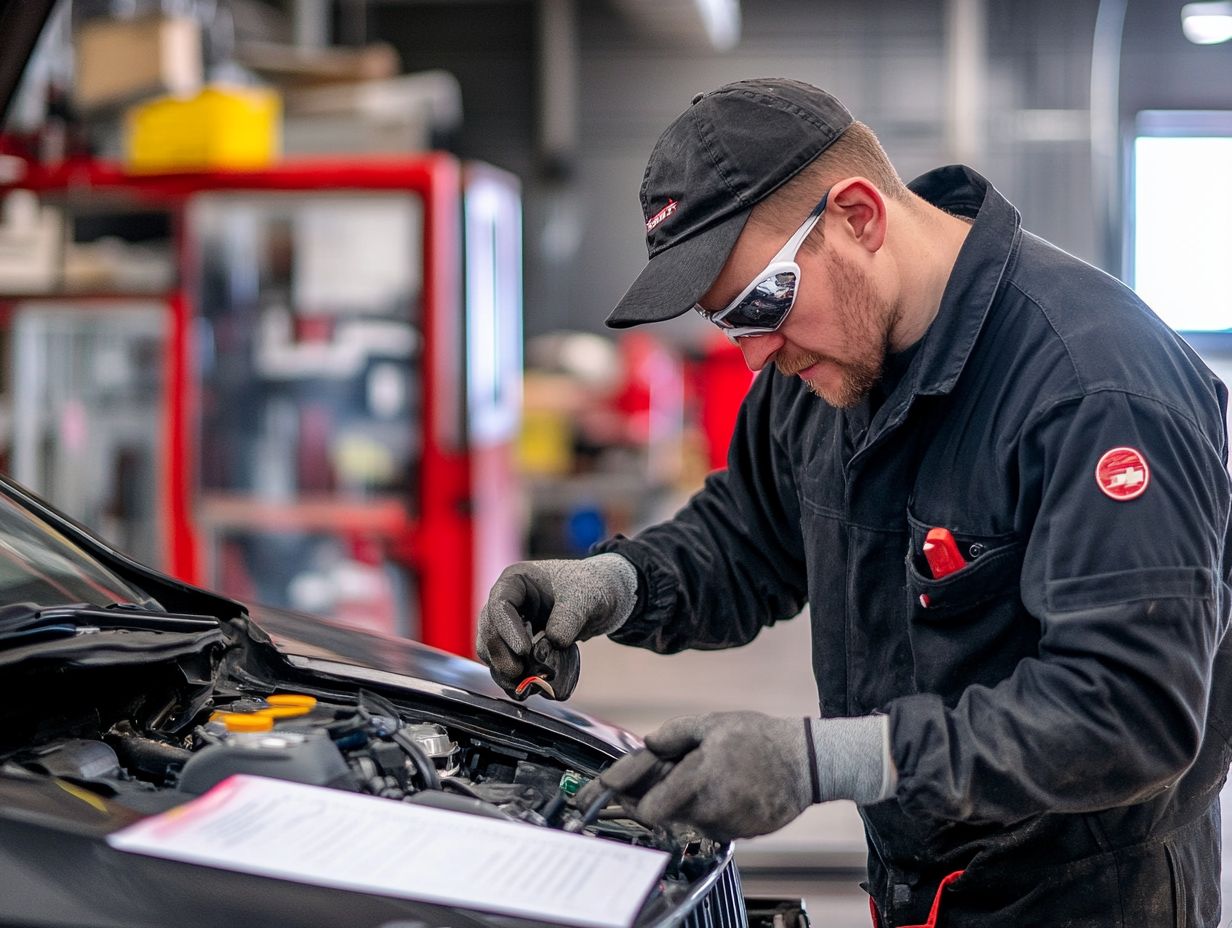The Impact of Aftermarket Parts on Warranty
Aftermarket parts can be an enticing choice for vehicle owners like you, especially when you re looking to save some money or boost performance. However, it s essential to weigh the various factors that come into play.
This article delves into what aftermarket parts are and the different types available. You’ll also find insights into how they affect your vehicle s warranty.
You ll receive valuable tips on how to protect your warranty while using aftermarket components.
Dive into this information now to make the best choices for your vehicle!
Contents
- Key Takeaways:
- Understanding Aftermarket Parts
- The Relationship Between Aftermarket Parts and Warranty
- The Legality of Using Aftermarket Parts
- Determining if Aftermarket Parts are Right for You
- How to Protect Your Warranty When Using Aftermarket Parts
- Frequently Asked Questions
- What are aftermarket parts and how do they impact warranty?
- Are aftermarket parts covered under warranty?
- Will using aftermarket parts affect my vehicle’s performance?
- Can using aftermarket parts affect the resale value of my vehicle?
- Are there any benefits to using aftermarket parts?
- Is it recommended to use aftermarket parts on a newer vehicle still under warranty?
Key Takeaways:

- Aftermarket parts refer to replacement parts made by manufacturers other than the original manufacturer (OEM). They can impact your warranty coverage, so it s important to understand this relationship.
- Using aftermarket parts may void your warranty, depending on local laws and regulations. Research and consider all factors before deciding to use them.
- To protect your warranty when using aftermarket parts, follow the manufacturer’s maintenance recommendations and keep detailed records of repairs or modifications. Consult with a trusted mechanic to understand the risks and benefits.
Understanding Aftermarket Parts
Understanding aftermarket parts is essential for vehicle owners and auto enthusiasts alike. These components provide valuable alternatives to original equipment manufacturer (OEM) parts, often at a more affordable price while still maintaining high quality.
Aftermarket parts can significantly enhance vehicle performance. They are a favorite among car modifiers and those engaged in heavy machinery repairs.
With a broad spectrum of options available, they cater to diverse needs. Whether you’re looking for performance upgrades or aesthetic improvements, aftermarket parts are an appealing choice for anyone eager to personalize their vehicle.
Definition and Types of Aftermarket Parts
Aftermarket parts are components crafted by manufacturers other than the original automaker. They are frequently utilized for vehicle modifications and repairs.
You can categorize these parts into several types:
- Performance parts enhance your vehicle’s speed and handling,
- Aesthetic upgrades improve your car’s appearance,
- Replacement parts swap out worn or damaged originals.
While many vehicle owners appreciate the cost-effectiveness and variety that aftermarket parts offer, it’s crucial to evaluate how they compare to OEM parts. OEM parts are produced by the original manufacturer of your vehicle.
Aftermarket options often open the door to greater customization possibilities. However, they may not always provide the same level of quality and compatibility as OEM parts.
This reality encourages you to carefully weigh your priorities before making a decision.
The Relationship Between Aftermarket Parts and Warranty
The connection between aftermarket parts and warranty coverage is often misinterpreted by vehicle owners. Understanding this relationship is essential for anyone considering modifications without risking their vehicle warranty.
Under the Magnuson-Moss Warranty Act, you have the right to use aftermarket parts without voiding your warranty, as long as those parts are of high quality and do not damage your vehicle. Understanding this can enable you to enhance your vehicle while maintaining peace of mind regarding your warranty.
How Aftermarket Parts Affect Warranty Coverage

Using aftermarket parts can significantly impact your vehicle’s warranty coverage.
This is especially true if those parts cause damage or if installation guidelines aren’t followed carefully.
For example, if you decide to swap out the factory-installed exhaust system for a high-performance aftermarket version, any engine-related issues that arise could be linked back to that new system. This potential link could result in denied warranty claims.
On the flip side, some manufacturers are more lenient and permit specific aftermarket components. This allows you to enhance your vehicle’s performance without jeopardizing your coverage.
It’s essential to carefully review the terms of your warranty and keep thorough records of all repairs and installations. This documentation can serve as crucial evidence in case disputes arise, ensuring that all parties are on the same page about the modifications made to your vehicle.
The Legality of Using Aftermarket Parts
The legality of using aftermarket parts can vary significantly from state to state, governed by laws designed to protect consumers while ensuring vehicle safety and performance.
In states like California and Washington, specific regulations outline the conditions under which aftermarket parts can be used. These regulations ensure compliance with safety standards and help preserve vehicle warranties.
Understanding these nuances is essential for making informed decisions about your vehicle’s modifications.
Laws and Regulations Regarding Aftermarket Parts
Various laws and regulations govern the use of aftermarket parts, including guidelines established by the Consumer Product Safety Commission and the FTC. These are designed to protect you from faulty components.
These organizations play a crucial role in ensuring that aftermarket products meet strict safety rules, thereby safeguarding your rights as a consumer.
The National Highway Traffic Safety Administration also regulates automotive parts to prevent the sale of counterfeit or substandard components that could jeopardize vehicle safety.
As a consumer, you have the right to report defective parts and seek restitution. Knowing your entitlements in the often convoluted world of automotive aftermarket products is vital.
Understanding these regulations empowers you and holds manufacturers accountable. Don’t let your rights be overlooked!
Determining if Aftermarket Parts are Right for You
Determining whether aftermarket parts are the right choice for you involves several critical factors that every vehicle owner should carefully consider.
You’ll want to assess your desired performance modifications, evaluate repair costs, and understand the potential implications for your vehicle’s warranty.
For auto enthusiasts like yourself, grasping the trade-offs between performance enhancements and any potential warranty repercussions is essential for making informed and confident decisions.
Factors to Consider Before Using Aftermarket Parts

Before you choose aftermarket parts for your vehicle, it s essential to consider several key factors. These include the impact on your warranty, potential repair costs, and the quality of the components you re about to invest in.
Weighing the long-term benefits against the initial investment is crucial.
Conducting thorough research will enhance your understanding of the differences between OEM (Original Equipment Manufacturer) and aftermarket options, enabling you to make a more informed decision.
Comparing various brands and diving into user reviews can provide valuable insights into the performance and durability of these parts. This ultimately saves you from unexpected repair costs in the future.
Understanding warranty implications is vital; using certain aftermarket components might void your existing coverage, which could result in costly fixes down the line.
Take the time to research and consult professionals about aftermarket parts before making decisions.
How to Protect Your Warranty When Using Aftermarket Parts
Safeguarding your vehicle warranty while using aftermarket parts requires careful following of installation instructions, diligent maintenance of service records, and clear communication with your insurance provider about any modifications.
By ensuring that installations are done correctly, you can significantly reduce the risks associated with warranty claims. This gives you peace of mind as you enhance your vehicle.
Must-Know Tips to Protect Your Warranty!
To maintain your warranty coverage while using aftermarket parts, follow these essential tips:
- Stick to installation guides.
- Keep detailed service records.
It’s crucial to document every repair and service performed on your vehicle. This creates a complete maintenance history. Such documentation protects you in case of disputes with manufacturers and verifies your adherence to warranty conditions.
Using high-quality aftermarket parts from reputable manufacturers can significantly reduce the risk of voiding your warranty. Subpar components may cause issues that could be linked to the aftermarket installation.
Understanding your warranty’s specific terms is equally important. You need to be aware of any stipulations regarding the use of aftermarket parts and what actions might unintentionally nullify your coverage. By staying informed, you can make smart choices that keep your vehicle running strong!
Frequently Asked Questions
What are aftermarket parts and how do they impact warranty?

Aftermarket parts are replacement parts for a vehicle that are not made by the original manufacturer. These parts are typically sold by third-party companies and vary in quality and price. Yes, aftermarket parts can sometimes impact a vehicle’s warranty, as they may void certain warranties or affect coverage.
Are aftermarket parts covered under warranty?
Yes, it depends on the warranty and the specific aftermarket part. Some warranties may explicitly state that using aftermarket parts will void the warranty, while others may cover certain aftermarket parts. Always read your warranty carefully and consult with a mechanic or dealership before installing any aftermarket parts.
Will using aftermarket parts affect my vehicle’s performance?
In some cases, yes. Aftermarket parts are not always made to the same standards as original manufacturer parts. This can impact your vehicle’s performance. It’s important to do thorough research and choose reputable aftermarket parts to ensure they won’t negatively affect your vehicle’s performance.
Can using aftermarket parts affect the resale value of my vehicle?
Yes, it depends on the quality of the aftermarket parts and how they were installed. If the parts were not installed correctly or caused damage, it could lower the resale value. Keep documentation of any aftermarket parts and their installation for future reference.
Are there any benefits to using aftermarket parts?
Yes, there can be benefits to using aftermarket parts. They are often cheaper than original manufacturer parts and provide more options for customization or performance upgrades. However, carefully consider the potential impact on your warranty and vehicle before making a decision.
Is it recommended to use aftermarket parts on a newer vehicle still under warranty?
It is not typically recommended to use aftermarket parts on a newer vehicle that is still under warranty. Doing so may void certain warranties and could cause issues with your vehicle’s performance or resale value. It’s best to consult with a mechanic or dealership before making any modifications to a vehicle still under warranty.
Don t leave your warranty to chance read your warranty terms today!




